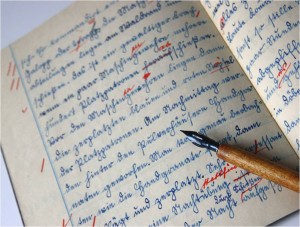Recently, my “Leap Year” essay generated a reader question that I wanted address here, in case you’re wondering the same thing:
At what stage did you work with a developmental editor? I’ve workshopped through classes and worked with critique groups, but I’m wondering if I get a manuscript in my best form should I just go with a developmental editor or continue with critique groups and beta readers?
This is a great question, but the answer will vary from writer to writer depending on where you’re at in the writing process and how valuable your critique group is.
With my first (unpublished) novel, The Ardent One, I sought feedback from a critique group and beta readers, and I even took the advice of a few agents who rejected me but were kind enough to offer some suggestions. While there was no shortage of people willing to voice their opinions about my work, I often felt frustrated and confused because the advice varied so dramatically that it was hard to sort the wheat from the chaff. Also, as a newbie, it was difficult to discern who I should trust.
With my second book, the one that became Empty Arms, I decided to do things differently and hire a professional who understands how to create a strong, compelling book and is also in tune with the literary industry. Looking back on it, my editor provided 3 important things that my critique group did not:
Credibility. The editor I worked with played an important role in the publication of many books. This was important to me because it showed that she was capable of helping writers take a work-in-progress and shape it into a final draft that is ready for publication.
Clear, actionable advice. In the past, I received a lot of ambiguous feedback. “Loved this.” Or “Didn’t like that.” Or “Good job.” But none of those comments gave me what I really needed: a deeper understanding of what was working, what wasn’t, why, and how to fix it. My editor showed me structural elements that weren’t working, identified distracting sub-plots that could be cut out entirely, helped me identify the true heart of the story, and questioned my characters’ motivations and authenticity…all the while, offering advice – and listening to my ideas – about how to fix it.
Coaching. After a long meeting with my editor, I faced a mountain of revisions that felt utterly overwhelming…but necessary. Rather than wishing me luck and going on her merry way, she encouraged me to revise my outline and send it to her. It took a while, but I did. And again, she showed me what was working, what wasn’t, and why. She offered thoughtful suggestions for improvement, and I revised it some more. We spent a few weeks going back and forth until the outline was really tight, which made tackling the revisions more manageable.
For me, the decision to work with a developmental editor came out of my desire to strengthen my skills as a writer, take my manuscript to the next level, and get published. I wasn’t getting the guidance and support I needed from my critque group or beta readers, so I decided to hire a professional. In the end it’s a personal decision, but an honest examination of your needs and how they’re currently being met should make the answer pretty clear.
If you’re still not sure if a developmental editor is right for you, you can read my Q&A with my editor, Marlene Adelstein, to learn more about what an editor can do for you, how to determine if your book is editor-ready, and how to find the right editor for you.
Do you have a question about my writing process?
If so, shoot me an e-mail: [email protected]






Erika, this is fantastic. Thank you so much for sharing it with us. Can you tell us how you found your editor, Marlene? Was that a process? Perhaps this could be another post 🙂 Thanks!
Great question, Jim. Check back tomorrow for the answer!
This is like an echo from my head. I’m about to embark on a developmental edit for many of the same reasons. I’ve enjoyed my critique groups, the workshops, the input from beta readers…but…
Once I made the decision and found the editor I want to work with, I experienced a huge sense of relief. Yes, I’m getting professional help. I’m not even committed to publishing this book but I want it to be the best possible work I can produce because someday I hope my grandkids will read it and I want them to enjoy the experience. If I can do other things with it, well that would be great too.
Enjoyed your post. = )
Leslie,
Congratulations on making the decision to work with a development editor. For me, it was the most valuable decision I’ve made and really helped me take my book to the next level.
So glad my post was relevant to what you’re going through. I wish you the best of luck with it!
Erika